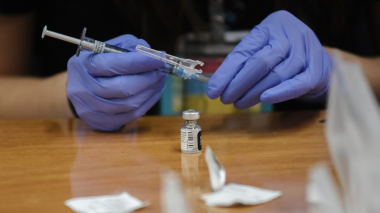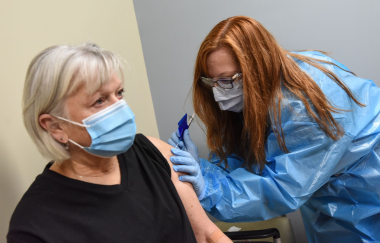Fear is overwhelming right now, and fear guides myths,” says Sveta Mohanan, MD, a family medicine physician at Atrium Health. During uncertain times, people crave information. But when information about coronavirus changes so rapidly and rumors spread just as quickly, the credibility and timeliness of that information become life-saving matters.
Patients’ questions to Atrium Health doctors have revealed common misconceptions about coronavirus. Here, we’d like to correct nine of the myths we’ve heard most frequently.
But first, Atrium Health providers share a plea to their patients: If you need information about coronavirus, please go to the CDC website, Atrium Health’s coronavirus webpage or call your primary care provider. Atrium Health providers belong to a vast international network of healthcare professionals around the world who share data in real time, and they should be your sources of credible, up-to-date information.
“Our teams are in constant communication,” says Amina Ahmed, MD, professor of infectious disease and epidemiology at Atrium Health Levine Children’s. “Our primary care providers are being updated minute by minute, and they should be your source of information.”
Myth 1: A flu shot (or pneumonia shot or other vaccine) can prevent coronavirus.
TRUTH: “A flu shot or pneumonia vaccine will not protect you from COVID-19,” says Dr. Mohanan. Currently, there is no vaccine available to prevent coronavirus.
Myth 2: For young people, it’s better to get coronavirus now to develop an immunity to it.
TRUTH: “There are no data currently that guarantee that once you get COVID-19 you'll get immunity,” says Dr. Mohanan. Even if coronavirus exposure does offer immunity, no one knows how long that immunity will last. “The other issue is that there's no way to predict the severity of your illness,” she says. “While 80% of people have mild to moderate infections, remember that moderate infections are not easy.”
Myth 3: Some people cannot catch coronavirus, including young children, African-Americans or people with HIV or sickle cell disease.
TRUTH: All groups are equally susceptible to catching coronavirus. “We see representation across all age groups, racial lines, ethnicities and more,” says Dr. Ahmed. “This affects a broad swath of society.” Certain groups, including those over 65 years old and those who have compromised immune systems, are more likely to have severe infections, but all people are susceptible to infection and to passing the virus onto others.
Myth 4: If I have symptoms of coronavirus, I should go to the emergency department for testing and treatment.
TRUTH: You should only go to the emergency department if you have severe symptoms, such as difficulty breathing or dehydration. Instead, call your doctor or an urgent care clinic for guidance. They’ll help you make the best decision about your care, which will include options like a virtual visit, phone call, or scheduled visit. If you wait in an emergency department, you risk exposing yourself and others to coronavirus and other infections.
Myth 5: Undocumented immigrants are at risk for deportation if they call a doctor or go to a hospital for coronavirus testing or treatment.
TRUTH: Atrium Health will not share patients’ immigration status. As COVID-19 is a public health concern, names of those testing positive have to be submitted to the health department to measure and control infection rates, but all information submitted is protected. Patients will not be referred to authorities if they are undocumented. Hospitals are considered sensitive locations, and according to the U.S. Immigration and Customs Enforcement’s (ICE) most recent statement, “ICE will not carry out enforcement operations at or near health care facilities, such as hospitals, doctors’ offices, accredited health clinics, and emergent or urgent care facilities.” For anyone with additional questions or concerns seeking support or information confidentially, please call the Charlotte Center for Legal Advocacy’s main line: 704-376-1600. Spanish-speaking representatives are available at 800-247-1931. Atrium Health partners with the Charlotte Center for Legal Advocacy through a grant-funded program to provide free legal aid to those in need.
Myth 6: I can use HIV medications/antibiotics/apple cider vinegar/hydroxychloroquine to treat coronavirus at home.
TRUTH: Leave treatment decisions to your doctor. Recommended treatments change constantly with new data, and some treatments that help hospitalized patients would hurt people who have milder symptoms. “Because hydroxychloroquine does have potentially serious side effects, the risk-benefit ratio would not weigh in favor of treating someone with it who has mild symptoms,” says Dr. Ahmed. Please consult with your primary care provider, who has the most current information.
Myth 7: Coronavirus affects all people equally.
TRUTH: While coronavirus has the potential to infect all people, its effects are more severe on vulnerable populations. “If your life is already somewhat chaotic because of homelessness, under-employment, under-insurance, chronic illness or domestic violence, then your baseline stress is already high. Then you add this? That’s quite profound,” says Dr. Mohanan. “For patients with depression and anxiety, it’s a whole different level.” Atrium Health community clinics, such as Atrium Health Biddle Point where Dr. Mohanan works, serve many vulnerable patients and are doing all they can to offer the services that patients need most. If you need help during this time – regarding prescription refills, self-isolation letters, mental health services or more – please call your primary care provider for information. If you need urgent mental health support, Atrium Health’s Behavioral Health Help Line is available 24/7 for crisis assistance at 704-444-2400 or 800-418-2065.
Myth 8: I have a dairy or gluten allergy. Does that mean I have a compromised immune system and am high-risk for a severe coronavirus infection?
TRUTH: No, food allergies will not compromise your immune system. High-risk individuals include people over 65 years old, those who take immune-suppressing medications, or those who have lung disease, heart disease, cancer, hypertension or diabetes.
Myth 9: I’m healthy and symptom-free, so it’s safe to resume normal activities and to invite people to my home.
TRUTH: Not true. People can have coronavirus without any symptoms yet still pass it to others. “Some people say, ‘I'm self-isolating, but I've had everybody in my family over.’ Well, you potentially created a pool of people who can go out and spread it to other people, if one of you has it and doesn't know,” says Dr. Mohanan. “If people don’t stay at home, we'll see a much faster rate of community exposure and infection, and more people will utilize hospital services – which have a finite number of resources – at all at once.” Please adhere to stay-at-home guidelines as long as officials recommend.
Learn more about COVID-19 and care options on Atrium Health’s website, also available in Spanish, or call the COVID-19 hotline 704-468-8888.



